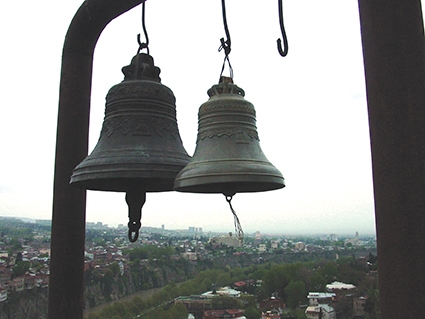For Whom the Bell Tolls…the Fight of the Churches, Round 2
OPED
There is great dissension within the Orthodox Christian community around the globe. Four out of fourteen autocephalous churches, and the Georgian among them, have chosen to boycott the Holy Council which will be held in Greece. Russia was the last to refuse participation, which has given a more political inclination to the whole process, aside from the spiritual one. Those in the spiritual circles are already openly discussing the fact that the confrontation between the Patriarchs of Constantinople and Russia has been accelerated by the invitation of the Council in Crete. Georgia supported Russia in this matter, and it seems that, like our civil government, the spiritual one is also facing the choice of Russia or the West.
On June 10th the Georgian Orthodox Church decided not to participate in the Council at Crete. The minutes of the Holy Synod suggest that several issues up for discussion in the Council were categorically unacceptable for the Georgian Orthodox Church, three of the six, in fact: “the reasons hindering marriage”, “the mission of the Orthodox Church in the modern world” and the third about changing some terminology. Despite the declared reason, the main motive was not declared in the decision of the Synod, which is the occupied territories and the authority of the Georgian Orthodox Church in those regions.
Since the Ecumenical Patriarchate of Constantinople engaged in a “Religious War” with the Russian Orthodox Church for spreading its influence in breakway Abkhazia, the relations between the Churches of Georgia and Constantinople have been tense. Bartholomew I of Constantinople supports the religious leaders working on the Mount of Athos, who demand recognition of the autocephaly of the Abkhazian Orthodox Church, unlike the religious leaders working in Sokhumi who believe that the Abkhazian Church is part of the Russian Orthodox Church. The Churches of Russia and Constantinople recognize de jure that the Church of Abkhazia is within the canonical borders of the Georgian Orthodox Church. However, their actions prove the opposite as religious leaders visiting Abkhazia from Tbilisi are refused access.
So far, the position of the Georgian Orthodox Church regarding the ecclesiastical status quo in the regions of Abkhazia and Tskhinvali is not quite clear, as these territories are within the Georgian canonical borders but are in reality governed by the Russian Orthodox Church. Before being appointed as the Minister, Paata Zakareishvili believed that if the influence of the Church of Constantinople increased in Abkhazia, this status quo would be infringed and the Georgian Church needed to be ready for it. “The Georgian Orthodox Church should decide what we prefer, who should be exercising priesthood in Abkhazia? The Church of Russia or Constantinople? A temporary authority should be granted considering this issue,” Zakareishvili said.
As the events developing around the Holy Council suggest, the Georgian Orthodox Church has given the first open implication of support to Russia. However, there might be an even bigger deal behind this choice, for example, the recovery of Georgian priesthood in some of the Abkhazian churches in Gali. Despite this hypothetic development of events, our demarche and such obvious support for the Russian Church might prove a fatal decision for Georgia’s Church. By taking this decision we choose to stand on the side of Russia, practically opposing the Church of Constantinople. And as an answer to this, if the Church of Constantinople develops the issue of Abkhazian and South Ossetian Churches and grants them autocephaly, Georgia will suffer a big blow, and probably a deserved one.
Zaza Jgarkava












